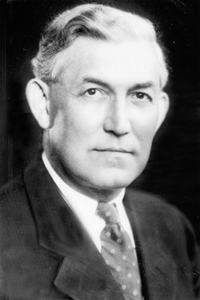罗伯特·丹尼·卡迈克尔
罗伯特·丹尼·卡迈克尔(英语:Robert Daniel Carmichael,1879年3月1日—1967年5月2日)是一名美国数学家。
| 罗伯特·丹尼·卡迈克尔 Robert Daniel Carmichael | |
|---|---|
 | |
| 出生 | 1879年3月1日 |
| 逝世 | 1967年5月2日(88岁) |
| 母校 | 普林斯顿大学 |
| 知名于 | 卡迈克尔数 卡迈克尔总计函数猜想 卡迈克尔定理 卡迈克尔函数 |
| 科学生涯 | |
| 研究领域 | 数学 |
| 机构 | 伊利诺伊大学厄巴纳-香槟分校 印第安纳大学 |
| 博士导师 | 乔治·戴维·伯克霍夫 |
| 博士生 | W·T·马丁 |
生平
编辑卡迈克尔出生于阿拉巴马州古德沃特。他曾短期就读于林维尔学院(Lineville College),并于1898年取得学士学位,当时他正在普林斯顿大学攻读博士学位1911年,卡迈克尔完成了数学博士学位的要求。他的数学博士研究是在美国著名数学家乔治·戴维·伯克霍夫的指导下完成的,被认为是美国人对数学微分方程知识的第一个重大贡献。
1911至1915年,卡迈克尔在印第安纳大学任教。之后,他转到伊利诺伊大学厄巴纳-香槟分校,从1915年直到1947年退休。
卡迈克尔因其对现在称卡迈克尔数(费马伪质数的子集,即满足费马小定理所描述的质数属性的数,尽管它们不是质数)、卡迈克尔总计函数猜想、卡迈克尔定理和卡迈克尔函数的研究而知名,这些研究在数论和质数研究中都非常重要。他发现了最小的卡迈克尔数561,50多年后,证实了有无限多个卡迈克尔数。卡迈克尔也在他1931年的论文《Tactical Configurations of Rank 2》和1937年的著作《Introduction to the Theory of Groups of Finite Order》中描述了施泰纳系统 S(5,8,24),但这个结构通常是以恩斯特·维特命名的,他在1938年重新发现了这个结构。
著作
编辑- The Theory of Relativity, 1st edition, New York: John Wiley & Sons, Inc., pp. 74, 1913.
- The Theory of Numbers, New York: John Wiley & Sons, Inc., pp. 94, 1914.[2]
- Diophantine analysis, 1st edition, New York: John Wiley & Sons, Inc., pp. 118, 1915.[2]
- The Theory of Relativity. 2nd edition (页面存档备份,存于互联网档案馆), New York: John Wiley & Sons, Inc., pp. 112, 1920.[3]
- A Debate on the Theory of Relativity, with an introduction by William Lowe Bryan, Chicago: Open Court Pub. CO., pp. 154, 1927.
- The calculus, Robert D. Carmichael and James H. Weaver, Boston/New York: Ginn & company, pp. 345, 1927.
- The Logic of Discovery, Chicago/London: Open Court Publishing CO., pp. 280, 1930;[4][5] Reprinted of Arno press, New York, 1975
- Mathematical Tables and Formulas, Robert D. Carmichael and Edwin R. Smith, Boston: Ginn & company, pp. 269, 1931; Reprint of Dover Publications, Inc., New York, 1962.
- The calculus, revised edition by Robert D. Carmichael, James H. Weaver and Lincoln La Paz, Boston/New York: Ginn & company, pp. 384, 1937.
- Introduction to the Theory of Groups of finite order, Boston/New York: Ginn & company, pp. 447, 1937;[6] Reprint of Dover Publications, Inc., New York, 1956.
参考资料
编辑- ^ For original papers on special theory of relativity, see wikisource:Author:Robert Daniel Carmichael.
- ^ 2.0 2.1 Dickson, L. E. Review of The Theory of Numbers by R. D. Carmichael & Diophantine Analysis by R. D. Carmichael. Bull. Amer. Math. Soc. 1916, 22: 303–310. doi:10.1090/S0002-9904-1916-02783-2 .
- ^ Review: The Theory of Relativity by R. D. Carmichael, 2nd edition. The American Mathematical Monthly. April 1921, 28: 175 [2024-10-04]. JSTOR 2972290. doi:10.2307/2972290. (原始内容存档于2020-07-19).
- ^ Northrop, F. S. C. Book Review: The Logic of Discovery. Bulletin of the American Mathematical Society. 1931, 37 (11): 807–809. doi:10.1090/S0002-9904-1931-05262-9 .
- ^ Dubs, Homer H. Reviewed work: The Logic of Discovery by R. D. Carmichael. The Journal of Philosophy. 1931, 28 (23): 637–639. JSTOR 2015687. doi:10.2307/2015687.
- ^ Weisner, Louis. Book Review: Introduction to the Theory of Groups of Finite Order. Bulletin of the American Mathematical Society. 1938, 44 (3): 178–179. doi:10.1090/S0002-9904-1938-06700-6 .